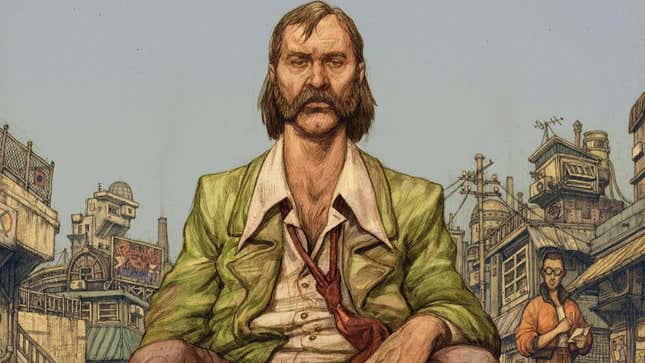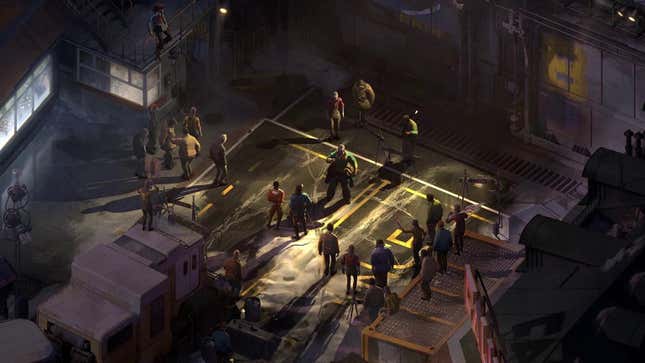
After being sued by one of its cofounders and accused of fraud, ZA/UM now says the lead writer behind 2019’s hit RPG, Disco Elysium, was fired for professional misconduct, including gender discrimination and verbally abusing co-workers. It’s the latest twist in a messy saga about the indie studio behind one of the most groundbreaking narrative games of the last decade.
It all started last month when Martin Luiga, a cofounder of the now-defunct Estonian art collective ZA/UM, revealed that members Robert Kurvitz, Aleksander Rostov, and Helen Hindpere were no longer employed by the game studio of the same name responsible for developing the critically acclaimed Disco Elysium. Luiga accused the studio’s business leaders of ousting the creatives, and questioned what it meant for the game’s potential sequel.
Kurvitz—who filed a lawsuit in late October—and Rostov now accuse two ZA/UM businessmen, CEO Ilmar Kompus and executive producer Tõnis Haavel, of committing fraud to take over the holding company that owns the studio.
“We have now learned that Tütreke OÜ must have obtained control over Zaum Studio OÜ by fraud,” the two wrote in a Medium post. “We believe the money used by Tütreke OÜ to buy the majority stake was taken illegally from Zaum Studio OÜ itself, money that belonged to the studio and all shareholders but was used for the benefit of one. Money that should have gone towards making the sequel.”
ZA/UM now accuses Kurvitz of fostering a toxic work environment and trying to illegally sell the company’s intellectual property.
“The rumor that our decision to terminate the contracts of these individuals was taken for financial gain is entirely unfounded and does not in any way reflect the facts,” the studio wrote in a statement provided to GamesIndustry.biz. “It was a decision that had to be taken for the wellbeing of the collective.”

The back-and-forth comes a day after a report in the Estonian newspaper Eesti Ekspress suggested Haavel was secretly in charge of the studio’s purse strings and top-level decision making. He denied it, and ZA/UM CEO Ilmar Kompus told the newspaper Kurvitz had not been fired over financial disagreements, but over a refusal to turn in satisfactory work and for treating colleagues poorly. Kompus went on to accuse Kurvitz specifically of belittling women in the past, and said that once the company was made aware it decided to take action.
“While active litigation limits what we can share publicly, we believe additional information will provide a more accurate picture given our former employees have neglected to mention key facts to reporters, on blogs, and in other public platforms,” the studio elaborated in statement to GamesIndustry.biz. It continued:
For clarity and accuracy, we are sharing the reasons for the justified firings of some former ZA/UM Studio team members:
- Limited to no engagement in their responsibilities and work – including not working at all for almost two years while still being paid by the studio – and forcing colleagues to compensate for their lack of effort.
- Creating a toxic work environment that is antithetical to the ZA/UM culture and team productivity.
- Misconduct in interacting with other colleagues that includes verbal abuse and gender discrimination.
- Attempts to illegally sell to other gaming companies ZA/UM’s intellectual property with the aim of undermining the rest of the team.
When asked by Kotaku, a spokesperson for ZA/UM declined to elaborate beyond its original statement, including whether the allegations also applied to Rostov as well as Helen Hindpere, another former Disco Elysium writer who was reportedly forced out by the studio. Rostov and Hindpere could not immediately be reached for comment. Kurvitz did not immediately respond.
According to Eesti Ekspress, ZA/UM was rocked by disagreements between the business and creative leaders within the studio, and a source described the acrimonious split to GamesIndustry.biz as, “CEO corporate scheming on one side, a toxic auteur on the other.” In addition, both the Eesti Ekspress report and Kurvitz and Rostov’s Medium post paint a complex picture of overlapping companies and investment vehicles with ZA/UM and its game development future caught in the crossfire.
Both sides now appear headed to court. In the meantime, Kotaku understands the100-person studio to be busy trying to shop around its next project for outside funding.
The full statements from ZA/UM, Kurvtiz, and Rostov are re-posted below.
ZA/UM:
ZA/UM Studio today released a statement to address recent team dismissals that have sparked litigation and media coverage: Our recent dismissal of a few members of the ZA/UM Studio team has led to legal filings and inaccurate news coverage. While we are confident that ZA/UM will prevail in court once all the facts are heard, we believe it is necessary to address baseless claims and falsehoods, if only to rightly defend ZA/UM and protect our employees.
“While active litigation limits what we can share publicly, we believe additional information will provide a more accurate picture given our former employees have neglected to mention key facts to reporters, on blogs, and in other public platforms. For clarity and accuracy, we are sharing the reasons for the justified firings of some former ZA/UM Studio team members:
● Limited to no engagement in their responsibilities and work – including not working at all for almost two years while still being paid by the studio – and forcing colleagues to compensate for their lack of effort.
● Creating a toxic work environment that is antithetical to the ZA/UM culture and team productivity.
● Misconduct in interacting with other colleagues that includes verbal abuse and gender discrimination.
● Attempts to illegally sell to other gaming companies ZA/UM’s intellectual property with the aim of undermining the rest of the team.
“ZA/UM cannot and will not tolerate egregious misconduct, even from individuals who, along with the broader team, have contributed to a game that we are exceptionally proud of and that continues to capture imaginations across the globe. In addition to creativity and innovation, ZA/UM also stands for professionalism, kindness, decency, and fairness, which we expect from all our employees. It would be shortsighted to accept anything less, as we need team players for the highly collaborative process that is creating games.
“The rumour that our decision to terminate the contracts of these individuals was taken for financial gain is entirely unfounded and does not in any way reflect the facts. It was a decision that had to be taken for the wellbeing of the collective. Further, ZA/UM denies any claim of financial malfeasance or fraud that is being held against us. The vast majority of profits from Disco Elysium have been invested back into the studio in order to fund our next projects, which are currently in development.
“We will not let the actions and comments of a vocal few distract from the important work of the studio. ZA/UM has tripled in size from a year ago to nearly 100 employees while retaining the vast majority of the team that worked on Disco Elysium. We have built a passionate and creative team of staggering talent that continues to combine storytelling, art, and technology in our efforts to elevate video games and redefine genres. We are excited to forge on doing this with all the love and brilliance in our hearts and minds. We have so much more to show you.
Kurvitz and Rostov:
We are Robert Kurvitz and Aleksander Rostov — the game director and art director of Disco Elysium. Our stake in the game exists in the form of minority shareholdings in an Estonian company called Zaum Studio OÜ, which owns everything related to the game. The majority of this company’s shares were initially held by Margus Linnamäe, an Estonian businessman and investor who provided the initial capital. In 2021, Linnamäe was bought out by another minority shareholder, an Estonian company Tütreke OÜ. Tütreke OÜ is a vehicle for two Estonian businessmen — Ilmar Kompus and Tõnis Haavel.
As minority shareholders our rights are limited. As long as Linnamäe remained the majority shareholder, we were confident that the company’s financials were in order and that all shareholders were being treated equally. The same can not be said for Kompus and Haavel. As soon as they became majority shareholders, we were quickly excluded from daily operations, our employment was terminated and our access to the company’s information was shut off. Our firing came weeks after we started asking for documents and financial data, which is still being kept from us.
We have now learned that Tütreke OÜ must have obtained control over Zaum Studio OÜ by fraud. We believe the money used by Tütreke OÜ to buy the majority stake was taken illegally from Zaum Studio OÜ itself, money that belonged to the studio and all shareholders but was used for the benefit of one. Money that should have gone towards making the sequel. We believe that these actions — which in our view, and the view of our lawyers, amount to criminal wrongdoing punishable by up to three years imprisonment — were perpetrated by Ilmar Kompus and Tõnis Haavel with support from Kaur Kender, another minority shareholder. This is hardly surprising given that Tõnis Haavel, who we believe to be the ringleader, has been convicted for defrauding investors on a different matter in 2007 [https://www.riigiteataja.ee/kohtulahendid/fail.html?fid=303963621].
We are now in the process of reviewing our legal options. Both civil claims and criminal charges are on the table — in Estonia and the United Kingdom.
Needless to say, it has been a very difficult time for us. After five years of gruelling work we released Disco Elysium, a game beloved by millions. As our reward, we were summarily fired and cut off from our life’s work — the world of Elysium. The company we built has been looted, while our own earnings are insufficient even to cover legal fees.
Until now, we’ve refrained from speaking out. This has been entirely voluntary, out of consideration for the people still working at ZA/UM — and for our own mental health. But given the severity of our suspicions — and the seriousness of the evidence we have — we think it’s time people knew what has transpired at the company.
We remain eternally thankful to all the fans of Disco Elysium, who have offered us invaluable moral support. We still believe in games, we still believe in ourselves — and we still believe in you. Millions of RPG fans have proven that games like Disco Elysium have a mass audience. This is a truly wonderous thing. No one can take that from us.
We also believe in what Harrier du Bois calls “the law”. It’s not perfect, but it’s there to protect those who create from those who take. And so it will.